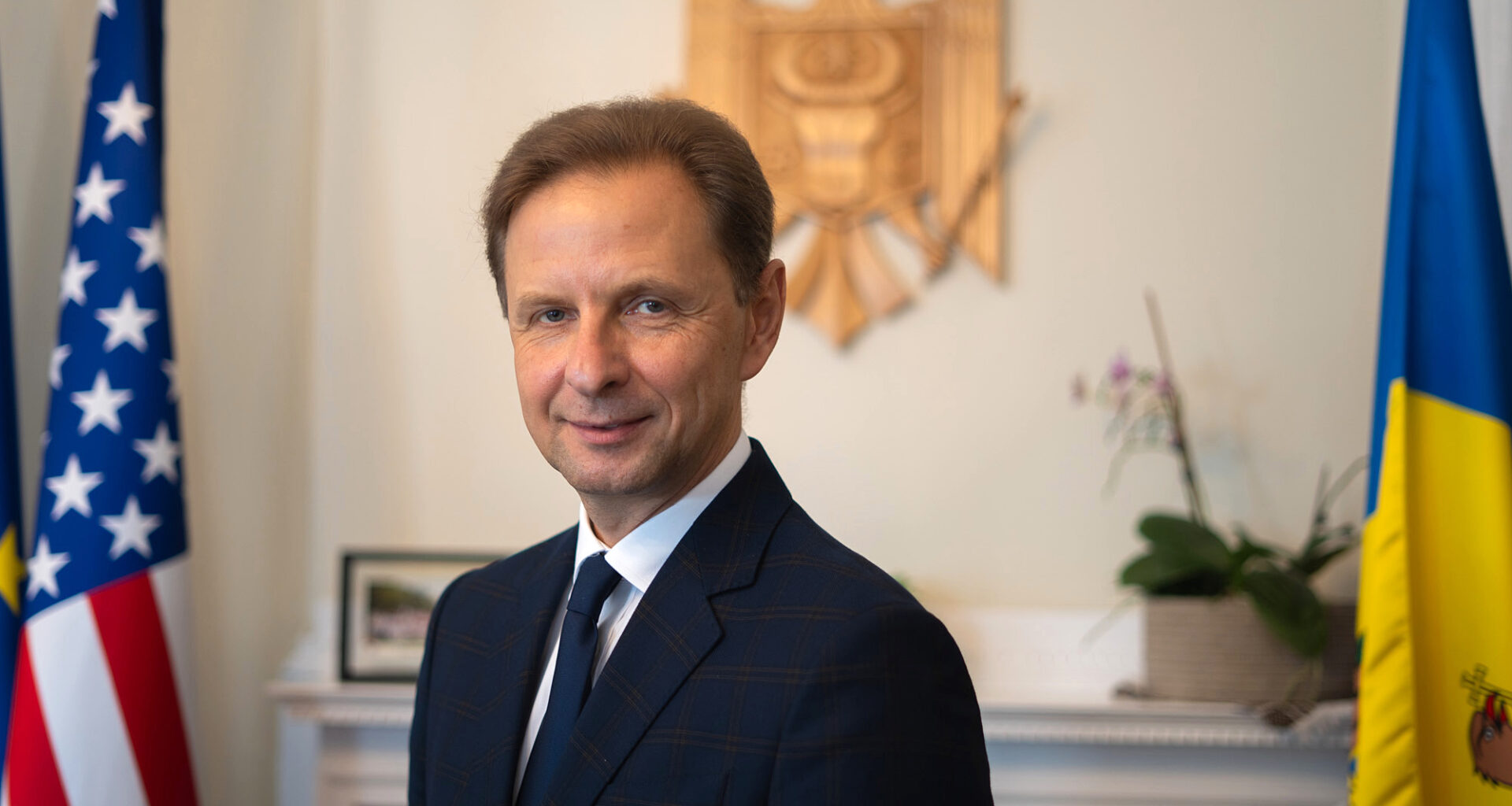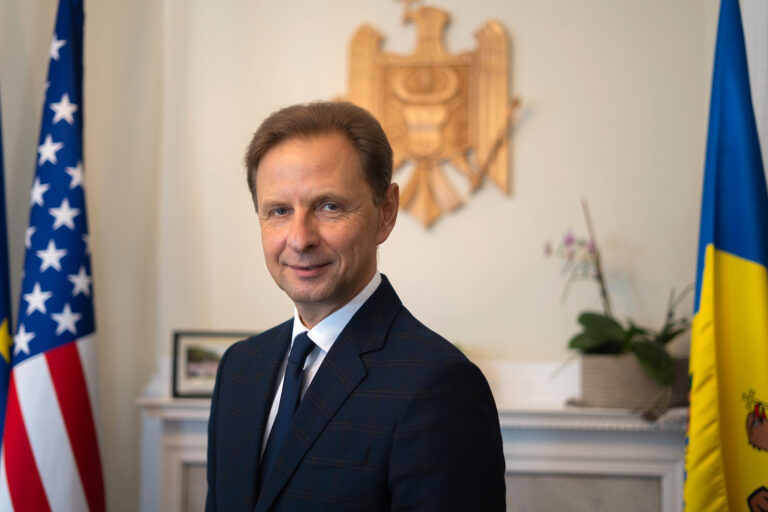
Vladislav Kuminski is Moldova’s new ambassador to the United States. (Photo by The Washington Diplomat)
One of Europe’s poorest and least-known countries, Moldova recently made world headlines when voters decisively rejected efforts by the Kremlin to install a pro-Russia party in Parliament.
Final results for the Sept. 28 election gave Moldova’s ruling pro-European Party of Action and Solidarity (PAS) 50.2% of the vote, while the pro-Russian Patriotic Electoral Bloc (BEP) received 24.2%. Three smaller parties split the remaining 25.6% fairly evenly, leaving PAS with a majority of 55 seats in the country’s 101-member Parliament.
It was a resounding victory for Moldovan President Maia Sandu—who founded PAS but was not up for re-election—and it came just four months after a similar result in neighboring Romania, a European Union member state with which it shares strong linguistic and cultural bonds.
Vladislav Kulminski, Moldova’s new ambassador to the United States, said the election itself was a milestone in Moldovan history—probably just as significant as Moldovan independence itself on Aug. 27, 1991.
 A “Welcome to Moldova” sign welcomes French-speaking tourists to the country’s international airport at Chisinău. (Photo by Larry Luxner)
A “Welcome to Moldova” sign welcomes French-speaking tourists to the country’s international airport at Chisinău. (Photo by Larry Luxner)
“Essentially, the Moldovan people said they will determine their own fate and destiny,” he told The Washington Diplomat in an interview last month. “They delivered a very clear message to the Russian Federation that Russian influence in the Republic of Moldova is not welcome.”
Kulminski added: “This is partly the result of the war in Ukraine. From 2022 on, it was obvious that Russia cannot bring back the Soviet Union; it brings death and destruction. Russia has been losing influence in the former USSR ever since the early ‘90s.”
In fact, Russian meddling in the former Soviet republic is nothing new, said John Herbst, senior director of the Atlantic Council’s Eurasia Center.
“Moscow’s interference in Moldova’s elections this year is just the latest of its more than 20-year effort to impose its will on its neighbors by manipulating elections,” Herbst, who served as US ambassador to Ukraine from 2003 to 2006, wrote recently in The New Atlanticist. “Moscow does this deftly in evolving circumstances using both old and new tactics.”
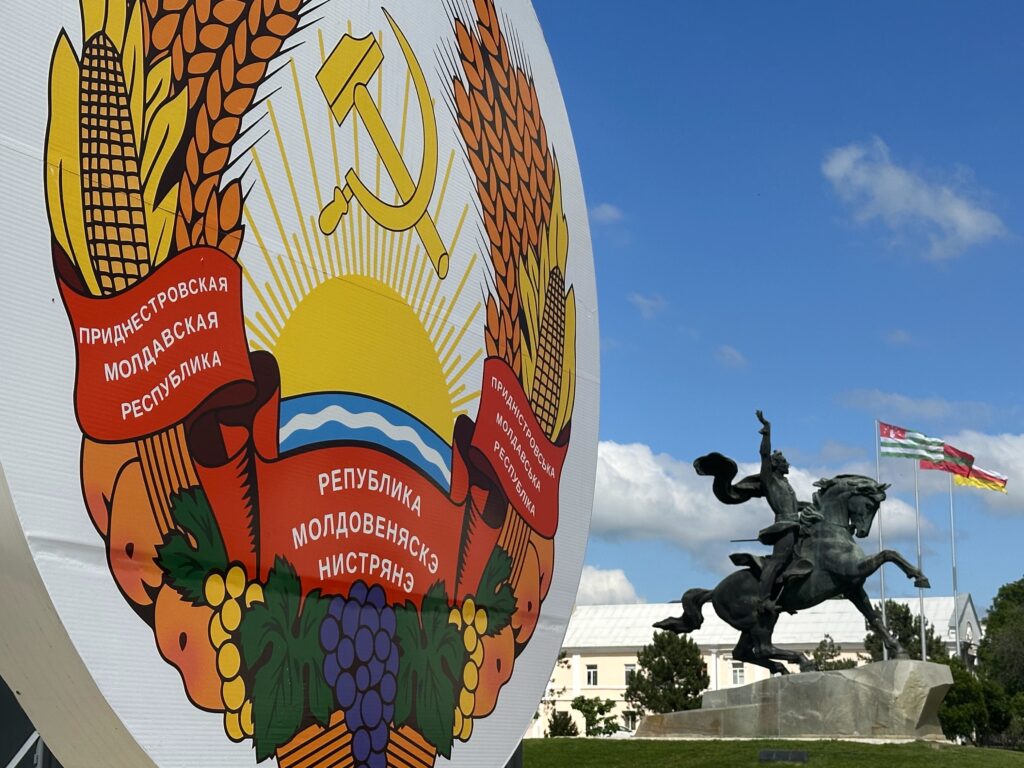 A large hammer-and-sickle reminiscent of the USSR towers over a statue of Alexander Suvorov on horseback, as seen in June 2025. Suvorov was the founder of Tiraspol, capital of Moldova’s breakaway republic of Transnistria. (Photo by Larry Luxner)
A large hammer-and-sickle reminiscent of the USSR towers over a statue of Alexander Suvorov on horseback, as seen in June 2025. Suvorov was the founder of Tiraspol, capital of Moldova’s breakaway republic of Transnistria. (Photo by Larry Luxner)
Some of those new tactics, he said, include paying online “ambassadors” handsomely to amplify anti-EU propaganda; the creation of vast networks of fake media outlets to circumvent Moldovan and EU sanctions; and death threats against public figures to reduce voter turnout.
The Russians, said Herbst, have also put together “slickly packaged ‘news stories’ that appear to be of Western origin, but which are in fact created by Kremlin-controlled bot farms located not just in Russia, but also in African countries.”
In November 2024, Sandu won reelection and vowed to pursue membership in the 27-member EU. Despite the latest election results, pro-EU and anti-EU factions continue to divide the vulnerable, landlocked country of 2.4 million, which shares a 759-mile border with Ukraine.
Complicating the situation is Transnistria, a breakaway region of Moldova squeezed between the Dniester River to the west and Ukraine to the east. Some 350,000 people live there—most of them in Tiraspol, capital of this self-proclaimed entity heavily influenced by Moscow.
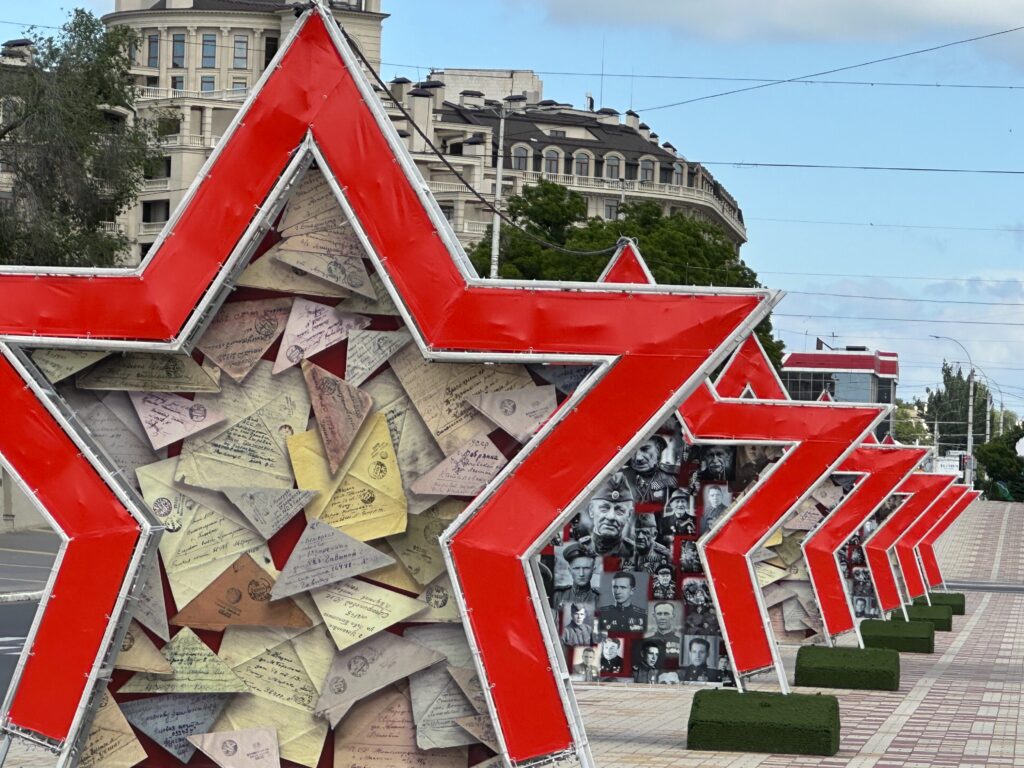 Enormous red stars containing patriotic images of World War II line the main boulevard of Tiraspol, capital of the breakaway region of Transnistria. (Photo by Larry Luxner)
Enormous red stars containing patriotic images of World War II line the main boulevard of Tiraspol, capital of the breakaway region of Transnistria. (Photo by Larry Luxner)
The Soviet Union still lives on here in this self-declared “Pridnestrovian Moldavian Republic.” Statues of Lenin dominate the main square of Tiraspol, as does a Soviet T-34 tank prominently displayed on a pedestal. Enormous red stars line Pokrovskaya Street across from the Alexander Suvorov Monument, named after the Russian general who founded Tiraspol in 1792.
In fact, Transnistria—which means “beyond the Dniester”—is the world’s only entity whose national coat of arms includes the hammer and sickle. Half a dozen travel agencies in Moldova’s capital, Chisinău, offer “Back in the USSR” day trips to see this sliver of Marxist nostalgia.
“Internationally, no country has recognized Transnistria—not even Russia. They know that doing so would mean losing it,” said Kulminski. “It would be impossible for Russia to defend an independent Transnistria. Over the years, the Moldovan government has chosen to pursue peaceful resolution through negotiations. That is our only policy. We need to be a factor of stability in a region marked by war.”
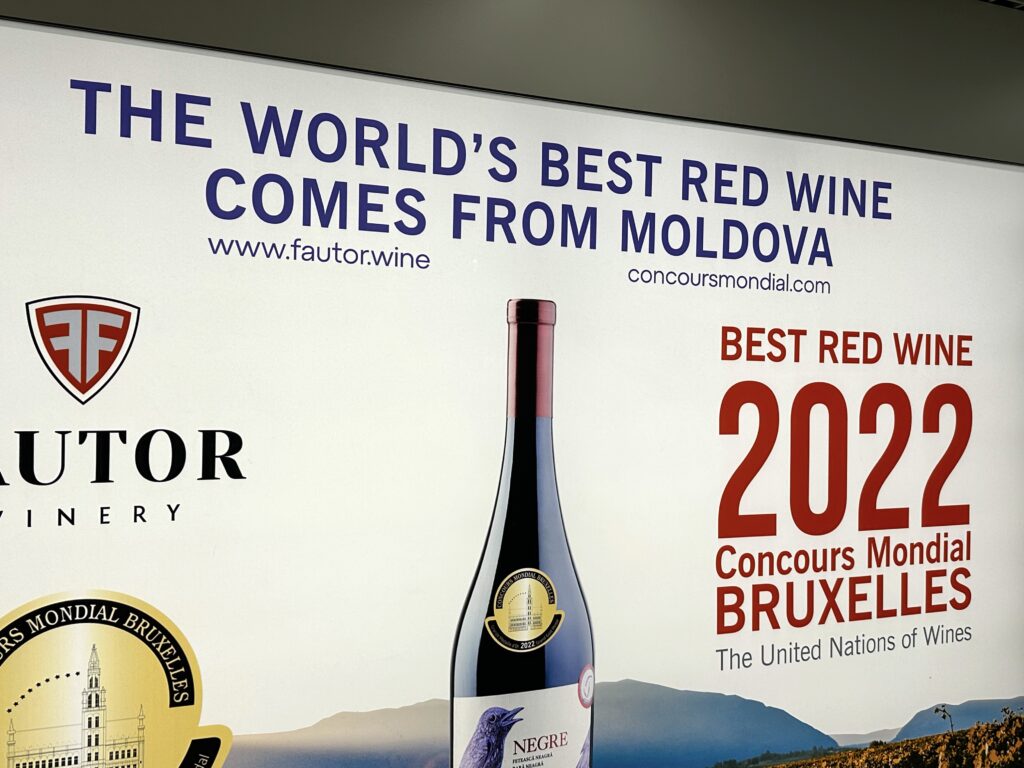 Advertisement at Chisinău International Airport touts Moldova’s famous red wines. (Photo by Larry Luxner)
Advertisement at Chisinău International Airport touts Moldova’s famous red wines. (Photo by Larry Luxner)
Kulminski, 52, is from Chișinău (formerly called Kishinev) and took up his new post here just over three months ago, replacing Viorel Ursu. The new ambassador speaks fluent Russian, Ukrainian, English and Romanian, as well as a little French. He’s now learning Spanish.
An expert in foreign policy and national security, he’s worked with the UN Development Program, Germany’s Gesellschaft für Internationale Zusammenarbeit, Humanitarian Dialogue and other international agencies. Among other things, Kulminski implemented the Black Sea Grain Initiative and has contributed to reform, social cohesion and peace-building programs throughout Eurasia, with a specific focus on Belarus, Ukraine and Turkey.
Kulminski was previously secretary of state for the Ministry of Foreign Affairs and European Integration. Later that year, he was named deputy prime minister at the Bureau of Reintegration—a body dealing specifically with Transnistria. Besides heading the Institute for Strategic Initiatives, Kulminski has also advised the World Bank on issues related to Moldova.
In 2024, Moldova ranked as Europe’s third poorest country, according to the IMF, with per-capita GDP of just $7,490; only Kosovo and Ukraine were worse off.
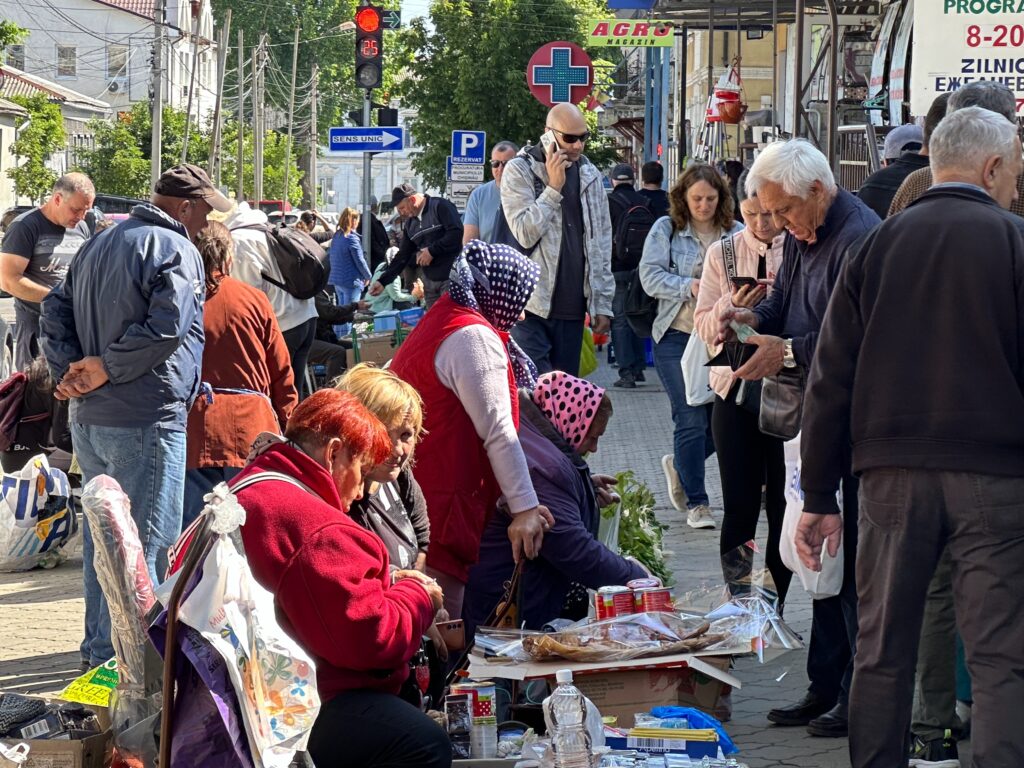 Shoppers hunt for bargains at an outdoor market in Chisinău, Moldova’s capital. (Photo by Larry Luxner)
Shoppers hunt for bargains at an outdoor market in Chisinău, Moldova’s capital. (Photo by Larry Luxner)
Yet it wasn’t always that way, said Kulminski.
“At the beginning of the ‘90s, Moldova’s per-capita income was on par with Romania. Today, we’re lagging behind,” he lamented. “The Baltic states—Estonia, Latvia and Lithuania—were the only ones who made a smart decision. We decided to be friends from East and West, which was a very bad mistake. Now it has become very clear that didn’t get us anywhere.”
He added: “The only question for us is, are we ready for the transition? Can we drag ourselves out of the Russian sphere of influence as the Baltic states did?” Kulminski thinks the answer is yes. To that end, the Sept. 28 elections “marked a U-turn in Moldovan politics,” he said.
“Russia can no longer maintain its geopolitical foothold, not only around the world but also in the former Soviet Union. Russia is on the retreat. They invested huge resources and money in an effort to buy votes, organize protests and throw Moldova into chaos. It all failed. Moldova, a small country, lived up to the task of protecting itself.”
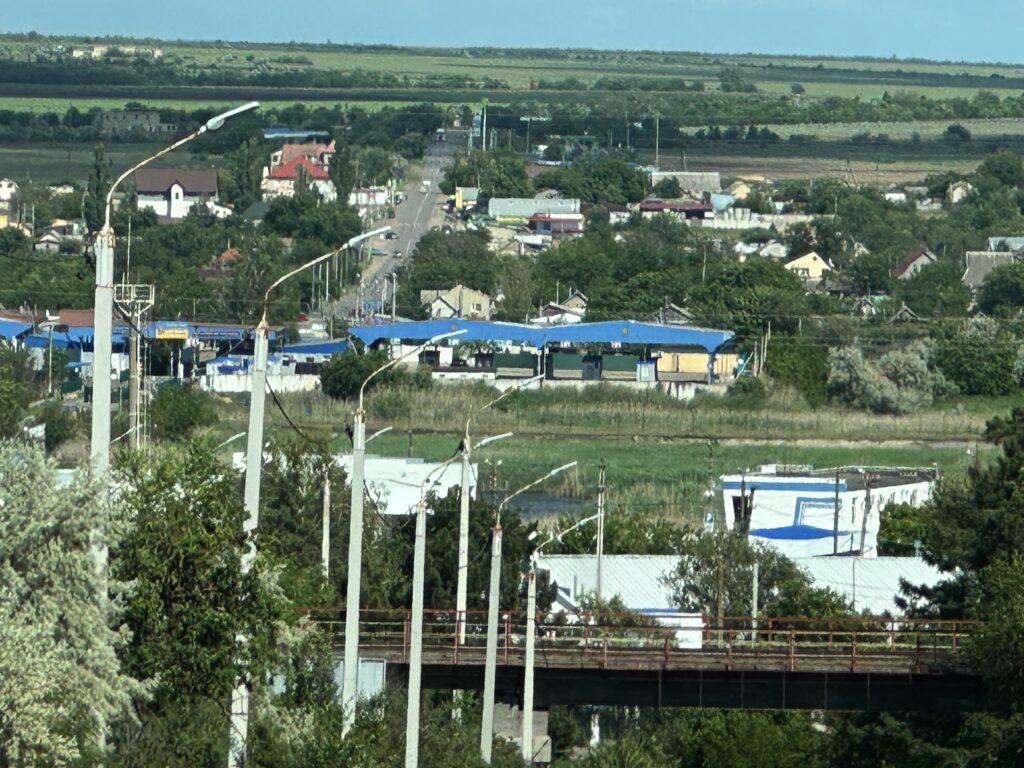 Moldova’s border crossing with Ukraine east of the Transnistrian village of Novokatovsk. (Photo by Larry Luxner)
Moldova’s border crossing with Ukraine east of the Transnistrian village of Novokatovsk. (Photo by Larry Luxner)
Kulminski said Moldova’s chances of emulating Romania, which joined the EU in 2004, are “pretty good”—though he cautioned that nothing should be taken for granted. “We’re starting very low, but let’s be frank. Not all countries that joined the EU were 100% ready for that.”
Even so, he told The Diplomat, “Moldova is on the brink of massive economic development. Things are changing very rapidly. We are a very different country from what we were at the start of 2022. Our sound management helped us keep Moldova out of the war, opening up clear prospects for EU accession. We’re rapidly aligning our legal and institutional framework with the EU, and that creates more predictability for business.”
In fact, he added, “once the war stops, we’re going to be in a very good geopolitical location. It will turn from a curse into a blessing.”
Evidence of Russia’s retreat can also be seen in Venezuela, where the Kremlin was once quite vocal in supporting that country’s authoritarian president, Nicolás Maduro. Today, the Russians barely have any influence in Caracas. The same is true in the Middle East, where the Trump administration brokered a ceasefire agreement between Israel and Hamas, effectively ending the Gaza war—with little to no involvement by Moscow.
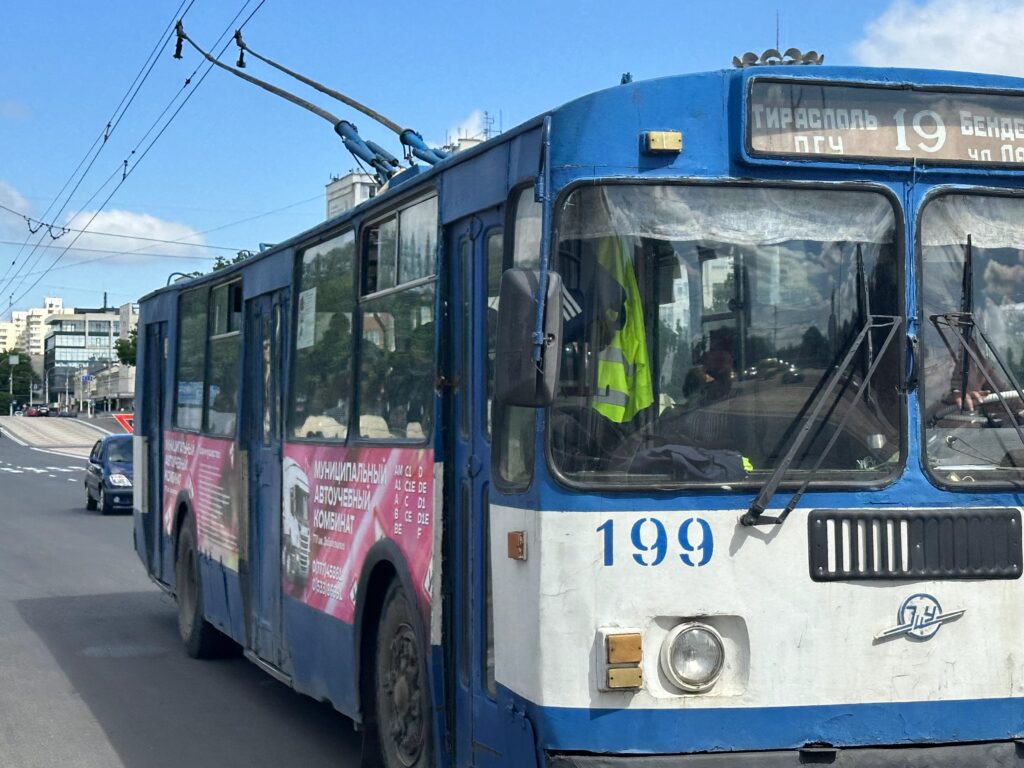 An ancient bus plies the main boulevard of Tiraspol, capital of the breakaway Moldovan region of Transnistria. (Photo by Larry Luxner)
An ancient bus plies the main boulevard of Tiraspol, capital of the breakaway Moldovan region of Transnistria. (Photo by Larry Luxner)
Perhaps most dramatically, the White House convened a meeting in early August between the presidents of two former Soviet republics—archenemies Armenia and Azerbaijan—effectively ending hostilities that dated back to even before the breakup of the USSR.
“I personally never expected that to happen,” said Kulminski. “It was a huge success of US foreign policy, peace thru strength—and Russia didn’t say a word. We tend to overestimate what it can do on the ground. And in Ukraine, it’s completely stuck.”
Kulminski is here in Washington with his wife, Rodica, who also works in the embassy. In fact, his toughest challenge since coming here isn’t Russian election interference. It’s keeping their two youngest kids—ages 3 and 5—from fighting with each other.
“This is one of the most difficult conflict resolution issues I’ve ever had to deal with,” he quipped. “Even more difficult than Transnistria.”
